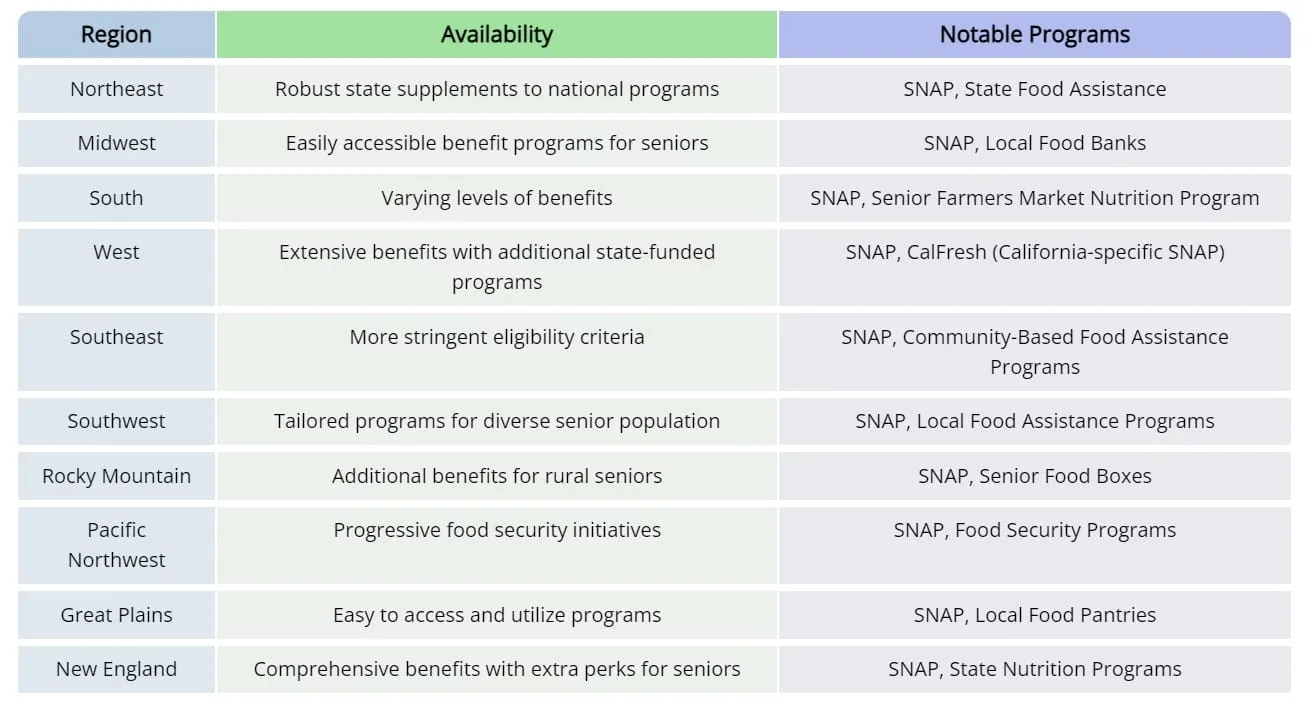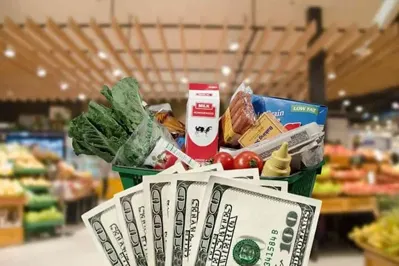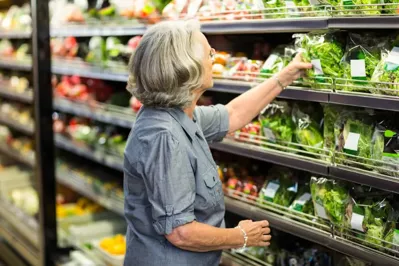2024 Grocery Benefits for Seniors in These Regions
Grocery assistance programs are vital resources that help individuals and families afford essential food items. For seniors, these programs can provide crucial support, particularly for those living on fixed incomes. We’ve conducted thorough research to offer insights into how seniors can take advantage of these programs and how to access them.

What Are Grocery Assistance Programs?
Grocery assistance programs, like the Supplemental Nutrition Assistance Program (SNAP), offer financial support to help individuals buy food. These initiatives aim to ensure that everyone, regardless of their income, has access to nutritious options. For seniors, various medical plans provide specific benefits, including some Medicare Advantage plans that offer Special Supplemental Benefits for the Chronically Ill (SSBCI). These benefits may include allowances for healthy groceries, acknowledging that proper nutrition is essential for managing chronic conditions and promoting overall well-being.
The Importance of Grocery Assistance
- Financial Relief: Provides support for grocery costs, enabling seniors to use their limited resources for other essential expenses such as healthcare and housing.
- Access to Nutritious Food: Ensures seniors can obtain healthy food, which is crucial for maintaining their health and quality of life.
- Long-Term Health: Promotes better long-term health outcomes by facilitating access to nutritious foods that can help manage and prevent chronic diseases.
High-Impact Benefits of Grocery Assistance Programs
Participating in grocery benefit programs can significantly impact seniors’ lives:
- Improved Nutrition: Regular access to nutritious food can improve overall health and prevent malnutrition.
- Increased Savings: Reducing grocery expenses can free up funds for other essential needs.
- Enhanced Independence: Reliable access to food allows seniors to maintain their independence and live more comfortably.
- Social Support: Many programs include social components, such as meal delivery services and community dining options, which can reduce isolation.
Types of Grocery Assistance Programs
Here are several types of grocery assistance programs available:
- SNAP (Supplemental Nutrition Assistance Program): Offers monthly benefits to help individuals purchase food.
- Medicare Advantage Plans with SSBCI: Some plans provide benefits specifically for healthy groceries.
- Local and State Programs: Various regional initiatives are designed to assist seniors in accessing food.
- Community-Based Programs: Non-profit organizations and local community centers often operate food assistance programs tailored for seniors.
Regional Availability of Grocery Benefits in the United States
The availability and details of grocery benefits can differ greatly across various regions in the United States:

How Seniors Can Access Grocery Benefits in the USA
Seniors can access grocery benefits through several avenues:
- State Social Services: Apply through state social services websites or local offices.
- Community Organizations: Many community organizations provide assistance with applications and gather necessary documentation.
- Regular Eligibility Checks: Regularly check eligibility as personal circumstances change.
- Senior Centers and Community Groups: These groups provide updates on benefits and valuable advice on community resources.
How to Apply for Grocery Assistance
- Prepare Documentation: Gather proof of income, proof of age, and residency documentation.
- Visit State Social Services Website: Complete the application online or visit a local office.
- Community Support: Seek assistance from community organizations that can help with the application process.
Conclusion
Grocery benefit programs are essential resources that can greatly improve the quality of life for seniors by ensuring access to necessary, nutritious food options. Many seniors may not be aware of these programs or their eligibility, making it important to stay informed and take initiative. By understanding the benefits available, regularly checking eligibility, and seeking help from local agencies and community organizations, seniors can optimize their access to affordable, healthy food. This proactive approach is crucial for leveraging these benefits to enhance overall well-being and maintain independence.
 How Seniors Could Access This Monthly Grocery BenefitsRecently introduced grocery benefits aim to ensure that everyone, regardless of their financial circumstances, has access to nutritious and delicious meals. Curious about this innovative initiative? We’ve conducted thorough research to determine if you qualify for these benefits.
How Seniors Could Access This Monthly Grocery BenefitsRecently introduced grocery benefits aim to ensure that everyone, regardless of their financial circumstances, has access to nutritious and delicious meals. Curious about this innovative initiative? We’ve conducted thorough research to determine if you qualify for these benefits. Top Meal Delivery Apps for Seniors in the U.S.As someone who has spent years helping seniors with various aspects of their daily lives, I understand how important it is to have access to nutritious, convenient meals, especially as we age. Cooking can become more challenging due to physical limitations or simply because many seniors prefer to spend their time on other activities. Thankfully, meal delivery services are an excellent solution, and with the rise of easy-to-use apps, seniors can now have healthy meals delivered right to their door.
Top Meal Delivery Apps for Seniors in the U.S.As someone who has spent years helping seniors with various aspects of their daily lives, I understand how important it is to have access to nutritious, convenient meals, especially as we age. Cooking can become more challenging due to physical limitations or simply because many seniors prefer to spend their time on other activities. Thankfully, meal delivery services are an excellent solution, and with the rise of easy-to-use apps, seniors can now have healthy meals delivered right to their door. Your state Seniors: Here Is How To Get The Medicare Free Grocery BenefitsGrocery benefits help seniors afford nutritious food, reducing the risk of food insecurity. In addition, certain plans offer coverage for meal delivery services, providing easy access to healthy meals.
Your state Seniors: Here Is How To Get The Medicare Free Grocery BenefitsGrocery benefits help seniors afford nutritious food, reducing the risk of food insecurity. In addition, certain plans offer coverage for meal delivery services, providing easy access to healthy meals.